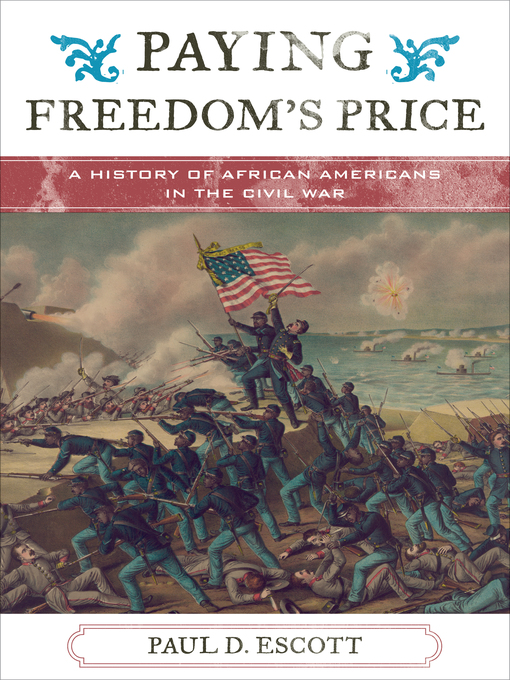Paying Freedom's Price
A History of African Americans in the Civil War
-
Creators
-
Series
-
Publisher
-
Release date
October 28, 2016 -
Formats
-
Kindle Book
-
OverDrive Read
- ISBN: 9781442255753
- File size: 7741 KB
-
EPUB ebook
- ISBN: 9781442255753
- File size: 7741 KB
-
-
Languages
- English
-
Reviews
-
Publisher's Weekly
October 24, 2016
Civil War expert Escott (Lincoln’s Dilemma), professor of history at Wake Forest University, serves up a slender slice of African-American history that will whet the appetite of readers looking for an introduction to the topic. The book’s content, structure, and simple prose make clear that students are its intended audience. Escott’s argument about the agency of African-Americans in securing their freedom during the war isn’t new, but remains important. Despite any personal relationships enslaved people may have forged with slave owners, Escott states unambiguously that “slaves hated their bondage and the coercion on which it was based.” Escott challenges persistent and unfounded assertions that enslaved African-Americans in the South willingly fought for the Confederacy. He goes on to explain why free African-Americans in the North supported the Union war effort. Escott’s discussion of black civil rights leadership is particularly illuminating and includes a fascinating discussion of the importance of education. The concluding chapter about the failure of Reconstruction is a sobering reminder of how deeply entrenched systemic racism is in the U.S. Though there’s value in a good historical synthesis, the book’s content is so wispy and so reliant on limited, dated scholarship that most instructors will think twice before assigning it. Illus. -
Booklist
January 1, 2017
In 1860, the black population of the U.S. numbered about 4 million enslaved people in the South and about 225,000 free people in the North. Civil War expert Escott examines the ripple effects of people fleeing slavery during the war wherever they could reach Union armies. His account of the responses of generals to freedom seekers along with policy decisions by Congress and President Lincoln reflects the ways the North gradually adopted the destruction of slavery as a prerequisite to victory. Escott also illuminates the actions of African Americans, collectively in resistance on plantations as well as by migration and by enlistment as soldiers; parses the impact of the advocacy of black leaders, such as Frederick Douglass and John Rock; and considers how African Americans' hard-won freedom was circumscribed by discrimination and reversals of progress, such as President Andrew Johnson's revocation of General William Sherman's redistribution of land to freed blacks. With a section of relevant documents, Escott's history provides an accessible and informative introduction to the complexity of the American black experience during the Civil War.(Reprinted with permission of Booklist, copyright 2017, American Library Association.)
-
Formats
- Kindle Book
- OverDrive Read
- EPUB ebook
subjects
Languages
- English
Loading
Why is availability limited?
×Availability can change throughout the month based on the library's budget. You can still place a hold on the title, and your hold will be automatically filled as soon as the title is available again.
The Kindle Book format for this title is not supported on:
×Read-along ebook
×The OverDrive Read format of this ebook has professional narration that plays while you read in your browser. Learn more here.


